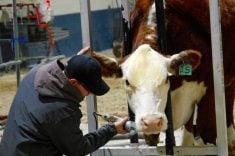The province has taken another step towards boosting protein research, but governments will need to cough up cash and find more people and equipment to make it happen, survey data shows.
“One of the key pillars of the Manitoba Protein Advantage is the harnessing of the great wealth of agri-food knowledge and research expertise in our province,” said Agriculture Minister Derek Johnson in a news release June 8.
He announced the province had released its Manitoba Protein Research Strategy, part of its ‘Manitoba Protein Advantage’ strategy.
Read Also

Manitoba crop insurance expands wildlife coverage, offers pilot programs
New crop insurance coverage is available to Manitoba farmers.
In September 2020 the province announced it would be taking stock of protein research and research assets in the province and then developing a framework to co-ordinate research going forward.
This involved surveying 116 academics, industry, government and non-profit representatives.
More than 80 per cent of respondents said their ability to do research was limited by funding. Ninety per cent of government representatives said funding was limiting them.
Lack of ‘highly qualified personnel’ is a limitation, according to over 47 per cent of respondents. This was most pronounced among academics, where 53 per cent said lack of qualified people is a problem.
Lack of necessary equipment was another oft-cited limitation, mentioned by over 38 per cent of respondents. Industry and academic respondents saw this problem the most, at about 43 per cent in both groups. Only 27 per cent of government respondents said equipment was an issue.
Other research hindrances included lack of collaboration with industry (41 per cent overall), processing capacity (19 per cent), collaboration with academia (16 per cent), and space (13 per cent).
“The key MPRS recommendations focus on the need for funding, collaboration with industry, training of highly qualified personnel and better understanding of provincial infrastructure,” the strategy report said.
The six recommendations in the strategy report are:
- Focusing efforts on the research priorities of climate resilience of protein food systems; novel sustainable protein products development; digital agriculture; and waste, water, byproduct and co-product utilization.
- Developing programming to fund these research priorities.
- Evolving the protein research strategy under the leadership of a “Strategic Research Chair in Sustainable Protein.”
- Leveraging existing structures to support the research chair.
- Strengthening “synergies” between the government, research community and industry.
- Collaborating with global experts and institutions.
The province announced it would invest $1.5 million to support the hiring of a research chair in sustainable protein at the University of Manitoba.
The chair will engage researchers, businesses and industry while leading strategic research priorities,” Johnson said.

















